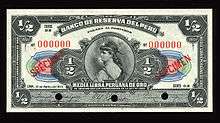Peruvian libra
| Peruvian libra | |
|---|---|
| libra peruana de oro (Spanish) | |
|
Half-libra banknote (1922) | |
| Denominations | |
| Banknotes | 1⁄2 libra, 1 libra, 5 libras, 10 libras |
| Coins | 1⁄5 libra, 1⁄2 libra, 1 libra |
| Demographics | |
| Date of introduction | 1898 |
| Date of withdrawal | 1931 |
| User(s) |
|
| Issuance | |
| Central bank | Reserve Bank of Peru (1922–1931) |
| Valuation | |
| Value | 1 libra = 10 soles |
|
This infobox shows the latest status before this currency was rendered obsolete. | |
The libra, also known as the libra peruana de oro ("Peruvian gold pound"), was a unit of currency issued in Peru between 1898 and 1931. It was equivalent to 10 soles and was issued in the form of gold coins and banknotes, which circulated alongside coins denominated in centavos and soles. The gold libra was equal to the British sovereign.

History
The first libra coins were minted in 1898, to the same standard as the British sovereign (113 grains of pure gold). In 1901, Peru adopted a gold standard based on the libra worth 10 soles. The gold standard was maintained until 1932 (see Peruvian sol for more details). Coins were issued until 1930, banknotes until 1933.
Coins
Three denominations were minted. The 1 libra was for issued circulation between 1898 and 1930, the ½ libra between 1902 and 1913, and the 1⁄5 libra between 1905 and 1930.
Banknotes
Between 1914 and 1918, Cheques Circulares were issued redeemable by six banks for ½, 1, 5 and 10 libras. The Reserve Bank of Peru took over the production of paper money in 1922, introducing notes for the same denominations as the earlier cheques. In 1933, some of these notes, together with unissued notes dated 1926, were overstamped by the Central Reserve Bank of Peru with their values in soles.
References
- Krause, Chester L.; Clifford Mishler (1991). Standard Catalog of World Coins: 1801–1991 (18th ed.). Krause Publications. ISBN 0873411501.
- Pick, Albert (1994). Standard Catalog of World Paper Money: General Issues. Colin R. Bruce II and Neil Shafer (editors) (7th ed.). Krause Publications. ISBN 0-87341-207-9.